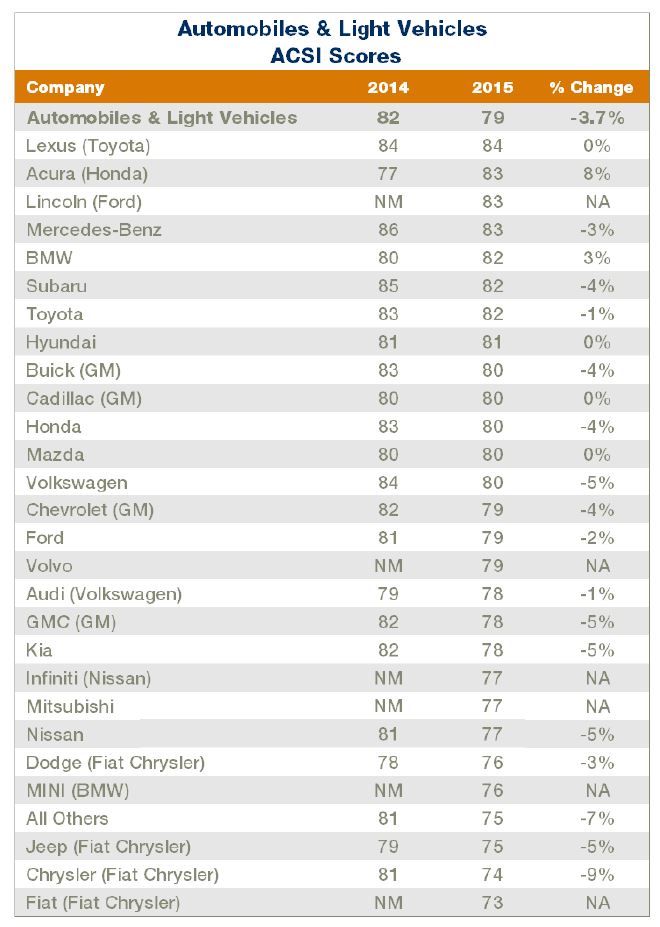Car buyer satisfaction is down for a third straight year as prices rise and recalls continue, according to new data from the American Customer Satisfaction Index (ACSI). Customer satisfaction with automobiles falls 3.7 percent to 79 on ACSI’s 100-point scale.
“While it is true that all cars are now much better than they were 10 to 20 years ago, it is alarming that so many of them have quality problems,” says Claes Fornell, ACSI Chairman and founder. “The number of recalls is at an all-time high. This should not happen with modern manufacturing technology and has negative consequences for driver safety, costs and customer satisfaction.”
Car owners report a 40 percent increase in recalls compared to the second quarter of 2014, which – along with rising prices – is damaging driver satisfaction. While quality problems abound, rising prices also are contributing to the decline in buyer satisfaction. As the economy improves, consumers are replacing older cars and sales are up – but so are prices.
“Higher prices are clearly hurting car buyer satisfaction, but low prices also have artificially inflated satisfaction in the years prior,” says David VanAmburg, ACSI Director. “The government’s Cash for Clunkers program helped push driver satisfaction to its highest level ever in 2009 – and heavy discounting as the economy recovered kept satisfaction up for a while. The customer satisfaction levels the auto industry is seeing now are more consistent with historical ACSI data.”

Among 27 nameplates tracked by the ACSI, 15 lose ground in customer satisfaction and only 2 improve from a year ago – both foreign-made. Foreign-made cars have a significant advantage in customer satisfaction and 77 percent of the above-average nameplates in the ACSI are imports. The highest-scoring automakers remain Japanese and luxury brands in general. Considering domestic automakers only, Ford, which includes the Lincoln nameplate, is the sole manufacturer maintaining overall customer satisfaction (81). General Motors slips to 79 (-3%) and Fiat Chrysler falls to 75 (-5%).
At the top of the industry overall, Toyota’s Lexus plateaus at 84, taking the lead from Mercedes-Benz, which falls 3 percent to 83. After a sharp drop to the bottom of the industry a year ago, Honda’s luxury brand Acura appears to have turned a corner. One of only two brands to improve this year, Acura rebounds 8 percent to 83, tied with Mercedes and Lincoln for second place.
BMW – the other gainer – rises 3 percent to 82. Also at 82 are Subaru (-4%) and Toyota (-1%), the top-scoring mass market automakers. Volkswagen (-5%), Buick (-4%) and Honda (-4%) all slip into a tie at 80. Cadillac and Mazda also score 80, unchanged since last year. Meanwhile, the Ford nameplate (-2%) and Chevrolet (-4%) drop to 79 alongside Volvo, which returns to the ACSI near the bottom of the luxury category.
The remaining automakers are below the industry average. GMC and Kia (each down 5%) match Audi (-1%) at 78, just ahead of Nissan (-5%) and Nissan’s luxury nameplate Infiniti, which debuts at 77. Mitsubishi also posts its first ACSI score of 77. BMW’s MINI enters the Index at 76, tying Fiat Chrysler’s Dodge. At the bottom of the category are all four Fiat Chrysler brands: Dodge (-3% to 76), Jeep (-5% to 75), Chrysler (-9% to 74) and Fiat (73).
The charts that follow show five-year customer satisfaction trends for domestic automakers in comparison with international manufacturers, as well as results for Detroit’s Big Three.
The ACSI report, which is based on 4,294 customer surveys collected in the second quarter of 2015, is available for free download at www.theacsi.org/news-and-resources/customer-satisfaction-reports/reports-2015/acsi-automobiles-report-2015.